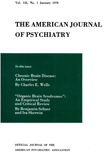A CASE OF ANOREXIA NERVOSA TREATED SUCCESSFULLY BY LEUCOTOMY
Abstract
An attempt has been made to present the successful treatment of one case of anorexia nervosa and to bring together some of the psychiatric, physiological, and surgical aspects of that case.
After 7 years' duration of the illness, the patient was in danger of death from starvation. She had been treated previously by electric shock, insulin, and psychoanalysis (incomplete).
A unilateral lower quadrant leucotomy was performed with direct visualization of the brain.
By 9 months after the operation the patient was maintaining her weight at a 40-pound gain. Tension had disappeared. Her interpersonal relations had improved markedly, and her IQ had risen 16 points. Ungraceful gestures and clothes improved. No physical complications or evidence of apathy, impulsivity, or irresponsibility were observed.
Physiologically there was evidence of hyperactivity of the adrenal sugar-regulating hormone before the operation. After the operation this physiological abnormality was corrected.
In spite of the fact that the leucotomy was successful in this case, it is believed that such an operation should be considered only after other forms of treatment have failed and should be as conservative as possible. ADDITIONAL NOTE (One year after the operation)
At this time the patient is doing well. She has no phobias that interfere with her daily life. She continues her studies at the university.
Her eating, although not adequate at times, has not interfered with her daily activities. She maintains a weight of 108 pounds.
Access content
To read the fulltext, please use one of the options below to sign in or purchase access.- Personal login
- Institutional Login
- Sign in via OpenAthens
- Register for access
-
Please login/register if you wish to pair your device and check access availability.
Not a subscriber?
PsychiatryOnline subscription options offer access to the DSM-5 library, books, journals, CME, and patient resources. This all-in-one virtual library provides psychiatrists and mental health professionals with key resources for diagnosis, treatment, research, and professional development.
Need more help? PsychiatryOnline Customer Service may be reached by emailing [email protected] or by calling 800-368-5777 (in the U.S.) or 703-907-7322 (outside the U.S.).



